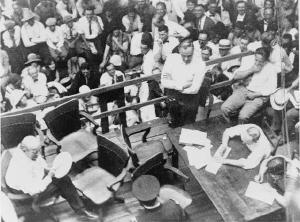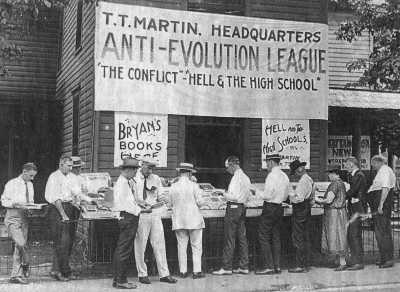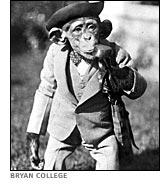
State v. John Scopes ("The Monkey Trial"), July 1925
When the 64th General Assembly of the State of Tennessee passed its anti-evolution statute that banned the teaching of evolution from public schools, the American Civil Liberties Union offered its services to anyone challenging the new Tennessee statute through newspaper advertisements. Some inhabitants of Dayton, a country township of less than 2,000 inhabitants, thought that publicity generated by a controversial trial might help Dayton's future.
John Scopes, the 24 year old local science teacher, could easily be talked into the scheme. Explaining that "the best time to scotch the snake is when it starts to wiggle" he agreed to be put on trial for having taught evolution. Herbert and Sue Hicks, two local attorneys and friends of Scopes, agreed to prosecute.
As the trial evolved, watched and reported by journalists from all over the USA, the guilt or innocence of John Scopes soon was of no interest. (Scopes never had to testify in the trial; he only had to attend the announcement of the verdict.) The statute in question was obviously unconstitutional, but the judge ruled the question of its constitutionality out of order, and the trial developed into a series of public lectures and interrogations on religious, social and intellectual values.
Caricatures in newspapers and magazines and songs about apes and men on radio stations gave the weeks before the trial a carnival atmosphere. The first day of the trial saw some 1,000 people crammed into the court room, where major radio stations had set up facilities to broadcast the proceedings live.
While the prosecution played on religious and nationalistic sentiments (It complained, for example, that the evolutionists had man descending "not even from American monkeys, but Old World monkeys"), the defence turned the trial into a nationwide lesson in biology through the testimony of Dr. Maynard Metcalf, a zoologist from the Johns Hopkins University, and through prepared statements of scientists. (The scientific evidence was later ruled inadmissible by the judge.)
The defence hoped for a second chance to prove the unconstitutionality of the Statute if it could get an opportunity for appeal. It asked the jury to return a guilty verdict. The jury complied, and John Scopes was fined $100, the minimum fine under the Statute.
The Tennessee Supreme Court reversed the decision of the Dayton court on a technicality but refused to address the question of constitutionality. The Statute remained in force until 1967.
Linder, D. (2002) State v. John Scopes ("The Monkey Trial"), University of Missouri Kansas City, School of Law, Scopes Trial Home Page, http://www.law.umkc.edu/faculty/projects/ftrials/scopes/scopes.htm (accessed 24 April 2004)

Journalists crowd around the prosecution and the defence during the trial

Literature stall of the Anti-Evolution League during the trial. William Jennings Bryan was the lawyer for the prosecution.
 An eywitness report from Dayton reported by PBS, the Public Broadcasting System of the USA:
An eywitness report from Dayton reported by PBS, the Public Broadcasting System of the USA:
Eloise Reed was 14 years old when the "monkey trial" came to her hometown of Dayton, Tennessee. Her parents wouldn't allow her inside the courtroom, but there was plenty to see outside. "The roadsides were all lined with cars," she remembers. "On the street corners you might see a minister with a Bible in his hand talking to a small group of people. Religious signs had been put up over town. There were girls with monkey dolls and hawkers on the street selling souvenirs."
Reed remembers a chimpanzee named Joe Mendi who sat in the drugstore and sipped a coke. A newspaper story describes movie cameramen taking pictures of Joe "wearing a plaid suit, a brown fedora and white spats, right in the yard of F. E. Robinson, who, besides owning the drugstore 'where it started,' also is President of the School Board." Reporter H. L. Mencken dubbed Dayton "monkeytown." Reed says that the only monkeys she met were just "passing through."
PBS American Experience, Monkey Trial, http://www.pbs.org/wgbh/amex/monkeytrial/peopleevents/e_trial.html (accessed 24 April 2004)